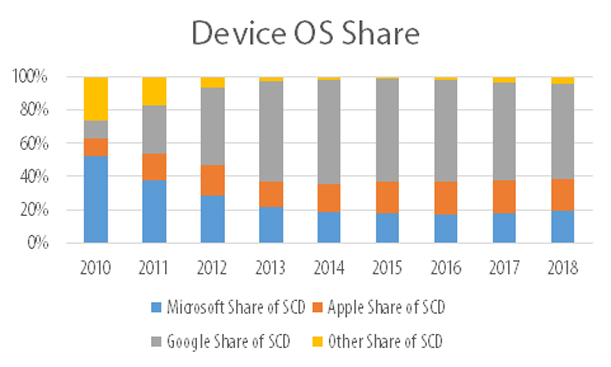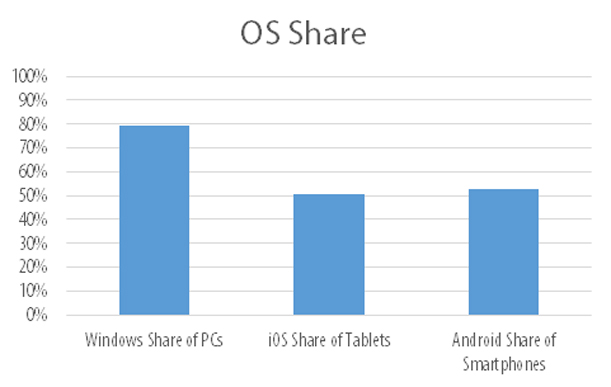|














 |

June 2, 2014
The operating system — OS for short — holds such a crucial place within our devices and our experiences with them that it seems nearly impossible to imagine a world without them, or even one in which they play a vastly diminished role. Yet that’s exactly what I believe will happen over the next few years.
Ironically, some of the key impetus for this change isn’t coming from a cutting-edge new startup or a cloud-focused company like Google, but from the most traditional and most OS-dependent company that exists today: Microsoft. In a startling reversal, the company that essentially created the modern operating system and the business models associated with it, is helping to lay the groundwork for a very different type of future.
The future vision I’m describing is based around a set of services that sit at a layer above the traditional device OS, and provide people and their devices access to the things they want: Music, movies, email, mapping, search, shopping, gaming, communications, documents, news, messaging, social media and more.
I refer to this combination of device-OS-independent services as a “metaOS,” but it’s a much different animal from the traditional OSes we’ve come to know and love (or loathe, depending on your perspective).
In a traditional device OS, apps are key, and serve as a critical differentiator between platforms. With a metaOS, however, apps are reduced to a more subservient role that merely enables the service to be accessed from a given device.
In a sense, they’re a necessary evil. Another critical difference has to do with influence and control. In a metaOS, it’s possible to mix and match services, spreading the potential opportunity across a much wider group of players, instead of being limited to the device-OS provider.
Arguably, the march to metaOS has already begun, and we’ve seen companies like Facebook, among many others, start to build new “platforms” that reach across all devices to provide a common experience.
At the same time, traditional device OS companies like Microsoft have also recognized the shift, and are starting to drive significant changes in their offerings to reflect this new reality. Witness not only the announcements to bring Office to iOS and Android, but even more telling, their Nokia X-Series phones, which layer Microsoft’s services (e.g., Bing, Skype, Xbox, Office, etc.) on top of Google’s Android OS.
While many scratched their heads about the logic behind the X-Series phones, it’s actually an impressively bold step into the future metaOS world, where services are not only a critical product differentiator, but the key to a new business model that monetizes services over software.
In a way, these changes are being inevitably drawn out by the diversity in the current device landscape. The chart below illustrates the current and projected worldwide market share by operating system across all smart connected devices (SCD), which is the combination of smartphones, tablets and PCs. Google holds the largest share, but both Apple and Microsoft are expected to still hold a large enough percentage in the future to lead to a stalemate.
It’s worth noting that, as a cloud-focused company, Google would be the most logical benefactor from the transition to services, yet its clear lead in device-OS share puts it in the potentially awkward spot of wanting/needing to sustain the traditional OS model.

©2014, TECHnalysis Research
To put these numbers into a more practical perspective, it’s very common to find people who have a Microsoft Windows-based PC, an Apple iOS-based tablet, and a Google Android-based smartphone. In fact, in a recent survey my firm conducted of 450 U.S.-based respondents, that’s exactly what we found.

©2014, TECHnalysis Research
The problem, of course, is that people don’t want their devices to exist in isolation, but instead expect them all to work together. The only way to effectively achieve that in a multi-OS, multi-device-per-person world is through a set of services that break through the barriers this technological diversity creates, and provide a common set of experiences across whatever combination of devices people happen to have. What we need are metaOSes.
Ultimately, it’s about a very simple need to let people do what they want on whatever device they want. That’s why it’s very clear to me — though it may seem like folly to some (and sacrilege to others) — that device operating systems, as we currently know them, are not long for this world.
Bob O’Donnell is the founder and chief analyst at Technalysis Research LLC, a technology market research and consulting firm. He also writes a weekly column and participates in a weekly podcast at Techpinions.com. Reach him @bobodtech.
Here's a link to the original column: http://recode.net/2014/06/02/rip-device-operating-systems/
Podcasts
Leveraging more than 10 years of award-winning, professional radio experience, TECHnalysis Research participates in a video-based podcast called Everything Technology.
LEARN MORE |
|
Research Schedule
A list of the documents that TECHnalysis Research plans to publish in 2015 can be found here.
READ MORE |
|










